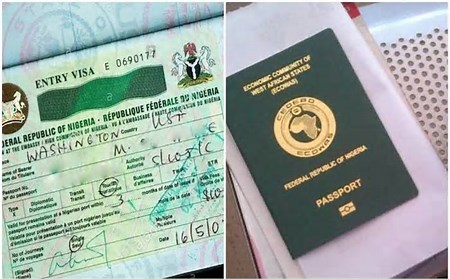Nigeria Slams 10-Year Ban on Expatriates in Sweeping Immigration Crackdown
Nigeria Slams 10-Year Ban on Expatriates in Sweeping Immigration Crackdown
By Achimi Muktar
In a bold move to tighten control over immigration and crack down on visa abuse, the Nigerian government has rolled out a sweeping set of reforms that could see expatriates banned from the country for up to 10 years if they overstay their welcome.
Unveiled by the Minister of Interior, Olubunmi Tunji-Ojo, during a high-level meeting with the Organised Private Sector at the Nigeria Employers’ Consultative Association House in Lagos, the new rules come with stiff penalties and a wave of tech-driven reforms designed to fix what the government calls a “broken and exploitable system.”
Effective August 1, any expatriate who overstays their visa by more than six months will be slapped with a five-year entry ban, while those who overstay by more than a year will face a decade-long prohibition from re-entering Nigeria. On top of that, overstayers will also be hit with a $15 daily fine for each day they remain in the country illegally.
But that’s not all.
Starting May 1, Nigeria will launch a completely revamped Expatriate Administration System, featuring an automated landing and exit card process, an Electronic Visa system promising approvals within 48 hours, and a tighter Expatriate Quota System to better track foreign professionals in the country.
“We need to establish the true number of foreigners living in the country. A nation without reliable data cannot progress,” Minister Tunji-Ojo said, emphasizing the urgency of the reform.
According to official records, fewer than 50,000 expatriates are currently registered in Nigeria—an estimate the Minister called “unrealistic and unacceptable.” He also revealed shocking cases where foreigners had stayed in Nigeria for decades on expired documents, exploiting loopholes in the system.
To ease the transition, the government is offering a three-month grace period from May 1 to July 31 for all expatriates to regularize their immigration status before the hammer drops in August.
Also coming into effect in May is a mandatory Expatriate Comprehensive Insurance policy to cover the cost of repatriation, a move aimed at reducing the financial burden on government coffers. Officials say millions have been spent on repatriating foreigners in distress—funds the new insurance plan is expected to save.
The overhaul doesn’t stop at immigration compliance. The Ministry also announced the automation of the Combined Expatriate Resident Permit and Alien Card (CERPAC) process and integration with Interpol systems to better monitor criminal activities and tighten national security.
The long-promised switch from the outdated visa-on-arrival process to a digital platform is also expected to reduce corruption and enhance transparency.
For those already living in Nigeria, the message is clear: get your papers in order or get out. And for potential visitors and foreign workers, it’s a new era of faster processes—but also stricter consequences.
As Nigeria modernizes its immigration framework, the government is betting on technology, accountability, and tough enforcement to reclaim control of its borders and ensure foreigners contribute meaningfully to the nation's economy.
“Gone are the days when you could just enter and disappear into the system,” said Tunji-Ojo. “Nigeria is no longer open for immigration abuse.”






















